|
Welcome to A&A. There are 40 reviews in this issue. Click on an artist to jump to the review, or simply scroll through the list. If you want information on any particular release, check out the Label info page. All reviews are written by Jon Worley unless otherwise noted. If you have any problems, criticisms or suggestions, drop me a line.
|
|
|
A&A #213 reviews (3/12/2001)
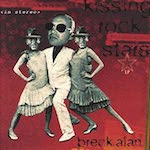 Breck Alan
Breck AlanKissing Rock Stars EP (self-released) Breck Alan is hard into the latter-day folk-rock sound. He's got that heavily syncopated rhythm section going and a bass player that sounds like he might prefer to get a little more into the groove sound. Alan sings in a way that says he thinks these songs are important statements. He's not too far off. Alan does have a fine way of building his songs to appropriate conclusions. So that when he arrives at his sometimes overly grandiose finales, at least it's easy to see where he's coming from. In the final analysis, these songs aren't quite as grand as Alan seems to believe they are. His pretentious delivery is almost justified, though, and it doesn't grate on me that much. Alan is one of those artists who might benefit from a little less craft and a little more emotion. If he lets just a little more of himself into the songs, he might give them that final spark they need.
Eric Alexandrakis Open Heart Surgery EP (self-released) One new song (the title track), one song from I.V. Catatonia and covers of songs by Pascal Obispo, the Hollowbodies and Hefner, all packaged up in a red hart box. A 3 oz. heart-shaped box of chocolates is also enclosed. A Valentine's gift for someone you love (provided they have an appropriately expansive notion of romance and donÕt mind cheap chocolate). The packaging was so cool I hated to break in. Then I heard the tunes. The title track alone is worth the cost, even if you hate chocolate. The covers are solid and all of the songs fit together sonically (somewhat unusual for the often frenetically eccentric Alexandrakis). He made the disc fit his theme without sacrificing anything artistically. I'm always impressed by artists who are able to create the total package, from music to graphic design. Alexandrakis' musical sense is impeccable and eclectic. He knows how to write a song, and then when he performs, he knows how to sell it. If the one you love can't get into this, maybe you picked the wrong one in the first place.
������������������������������������� 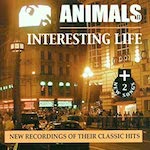 The Animals
The AnimalsInteresting Life (A2) A band re-recording its old hits is always a dubious proposition. Even if the new versions are better technically or artistically (which rarely happens), the old recordings are what fans know and love. And so, the only reason for such an enterprise is cash. This edition of the Animals features two original members (Hilton Valentine and John Steel) and one member who joined after the first album (Dave Rowberry). You'll notice the absence of the names Eric Burdon or Alan Price. That doesn't necessarily mean anything, but it might explain why there are only two new songs here. These are competent run-throughs of some of the Animals' big hits, including "House of the Rising Sun." The thing is, the originals are better. They're got more energy and they have a rawer sound. These songs require that sort of edge, and here the sound is smooth and easy. Not what's needed. This may raise some cash for the boys. That's okay. But it's not a worthy part of the band's legacy. Some things are better left the way they were.
������������������������������������� 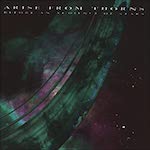 Arise from Thorns
Arise from ThornsBefore an Audience of Stars (Dark Symphonies) If there was such a thing as a goth groove band, well, Arise from Thorns might be it. The songs are built around elaborate acoustic guitar lines, with strings, keyboards, an electric lead guitar and more layered on top. The female vocals soar above the maelstrom, topping off the sound. Arise from Thorns can get a little heavy (this is Dark Symphonies, of course), but for the most part, the sound is restrained. More prog than heavy, with an inclination to jam in a looser style. The production sound is precise and clear, which only emphasizes the prog elements more. This technically-exacting feel also shows off the complex arrangements the band spins with apparent ease. No easy listening here. Rather, a melding of styles and ideas that creates a sound solely inhabited by Arise from Thorns. Invade this world, and be seduced. One note: This is a re-issue. Arise from Thorns has changed its membership somewhat and is now known as Brave. Just so you don't get confused.
�������������������������������������  Ataraxia
AtaraxiaSueños EP (Cold Meat Industry) Embracing the medieval and the martial, Ataraxia's strident rhythms and melodies demand immediate attention. Once gained, that attention is immediately impressed by the intense quality of the music. This is an album in three parts, each part containing four songs (movements? perhaps). I think the parts hold together thematically better than musically (the lyrics are in Italian, French and Spanish--I think--as well as English, so I can't quite be sure). As far as the music goes, the album holds together much better than any part. There are some songs of almost ungodly beauty (most of the album, really), as well as a couple that almost tore my head off. Ataraxia just about ignores such issues, preferring instead to simply make music that makes sense to the band. The restrained production gives the pretty songs a fragile quality that simply enhances them. Pretty? Yes. Challenging? Absolutely. Ataraxia doesn't cut any corners. This is music that requires active listening. Such an effort, though, will be rewarded immensely. Seek and ye shall find.
 Baby Carrot
Baby CarrotPlay Every Day (Some Guy Down the Street) When the first song on an album is titled "Chinese Food & Donut," it might be forgivable to assume the guys might be a little quirky. That's really not the case here. Baby Carrot does play a form of pop music, albeit one that often incorporates the strident sounds of emo and a fairly technical approach to song construction. Makes it kinda hard to get into the stuff. This isn't an immediately attractive sound. The simple, yet deliberate, attack just doesn't bring out the easy smiles. So the question becomes, does this sound have the necessary depth? Can it stand up to repeat listenings? I feel better about the answers to those queries. Baby Carrot's intensity and forcefulness does add a nice coloration. There may be something behind the simplicity that, indeed, makes these songs more than they seem. I'm not entirely convinced. Albums like these, ones of obvious quality that don't quite leap out at me, are the hardest to review. Baby Carrot simply does not provide a facile entry point. A listener must to break down a couple walls to really get inside the sound. The effort may well be worthwhile. I'm just not sure.
 Big in Japan
Big in JapanDestroy the New Rock (Honest Don's) Crunchy, hooky punk rawk. There was a time that this might have been described as the San Diego sound, but these boys are from Reno and that was 10 years ago. Sounds can migrate. The key here is to make the hooks thickly sweet and to keep the riffage moving. Big in Japan does it just right. These songs simply abound with joy. Lots and lotsa fun ringing out. Big in Japan really works out the hooks, too. This is a bit more polished than I was expecting when I heard the first chords crashing. There's almost a Joe Jackson feel to some of this stuff (you know, like I'm the Man era). I likes that a bunch. This album gets more and more attractive as each song blasts through. Big in Japan combines a wild mass of energy with some serious craft. Instead of sounding stilted, however, this just sounds "together." Found all the pieces. What rock and roll should be, methinks.
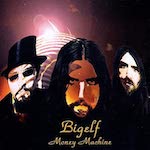 Bigelf
BigelfMoney Machine (Record Heaven Music) Record Heaven calls itself a "classic rock" label, and I suppose there isn't a better way to describe the sound that Bigelf is going after. A few specifics might help, though. Bigelf focuses on the organ-heavy sound of British hard rock in the early 70s, with more than a nod to the complex harmonies and chord structures of the later Beatles. Bigelf acquits itself admirably. Without directly stealing any particular sound, the guys have managed to replicate a time and a feel and even write songs with something of a modern flair. Maybe it's the stoner rock moments that give me that impression. Hard to say. I'm still not the biggest fan of revivalists like these, but Bigelf does as good a job as I've heard in a while. There are enough different ideas to keep the sound fresh (or as fresh as possible, anyway), and the guys really work to give the songs a bright energy. If you're gonna do something like this, you might as well do it this way.
���������������������������������� ������������������������������������� 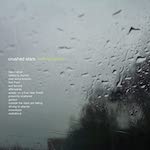 Crushed Stars
Crushed StarsSelf Navigation (Simulcast) Mostly Todd Gautreau, with Matt Pence on drums and Marc Daigle helping out with a little guitar. Gautreau creates a meditative mood and sticks to it. There are the occasional 70s horn-by-keyboard (if you know what I mean), but mostly Gautreau establishes his feel with a strummed electric guitar. He's not in a hurry. And despite the languid pace of the songs (and, thus, the album), things don't get dull. Gautreau imbues his sound with such feeling and grace that it's hard to let go. Utterly seductive. That sound. It is the sound that really makes this disc. A certain echo in that guitar, the way the keyboards add just the right touch. Almost everything on this album has a delicate touch, to the extent that even the slightest heavy hand could ruin things. That doesn't happen. This album could not be forced. It simply had to flow, and it does. Crushed Stars has made music of uncommon elegance. Its muted dramatics are as moving as the most bombastic symphony. Utterly moving.
�������������������������������������  Evil Beaver
Evil BeaverLick It! (frootynation) Not many bands are driven by bass lines. Not bouncy, groovy licks but throbbing, insistently pounding sounds. Evil Beaver reminds me a bit of early Jane's Addiction, though the singer is a woman (rather than a guy who sounds like a woman). Also, the sound is a bit more simplistic, though the trend toward maelstromic excess is much the same. Evil Beaver sticks to convention a bit much, and that keeps its songs from always hitting the highs and lows perfectly. Even so, these songs have a surfeit of adrenaline. No shortages in that department, to be sure. One of the areas that might be improved is in the production sound. Evil Beaver needs to make the mix sharper, allowing the players a little more room to operate. There's a bit of a muddle, and it doesn't help the songs. Still, there's a whole lot here to like. The songs take no prisoners, and the band rips through them with abandon. I do wish the writing would take a few more chances (some surprises are always nice), and the sound here could be much better, but in all I'm still quite impressed.
������������������������������  Fabulous Disaster
Fabulous DisasterPut Out or Get Out (Pink & Black) Basic fare. Three chords, lots of attitude and some oozin' ahs. The key to this stuff is the attitude. The music is generic, though in a pleasing sense. Fabulous Disaster's character comes from the band's swagger. And I love the stance. Four women who don't take shit from no one. In fact, they specialize in giving it away. The lyrics are clever enough to find plenty of ways to say "fuck off." I'm impressed. Every once in a while the gals try to make a more serious point. That works some of the time. It does detract from the attitude factor, though the change of pace helps. I'm kinda ambivalent about those moves. Musically, Fabulous Disaster trolls in the same waters as plenty of fast, trashy bands, though the tight production from Fat Mike and Ryan Greene does lend a somewhat clean quality to the sound. I do wish the band would spend a little more time picking different chords to abuse. Even so, I had a great time.
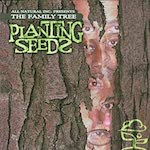 The Family Tree
The Family TreePlanting Seeds (self-released) Something of an off-shoot (no pun intended) of the All Natural collective, this disc collects a number of different DJs and MCs under the Family Tree moniker. The beats are often buried behind distortion or reverb (or simply muffled), which reminds me of some Wordsound fare. The rhyming is all over the map, some sloppy and some carefully crafted. Certainly, the best fare on the album comes from the All Natural crew itself, though the instrumental beat explorations from G(riot) are also first rate. Indeed, the one common thread throughout the disc is a commitment to good beat work. Just a sampler, I guess, but one that provides a fine picture of artistic ferment. The somewhat haphazard sequencing (not all songs flow particularly well into each other) is forgivable given the diversity of the set. Most enjoyable.
������������������������������ 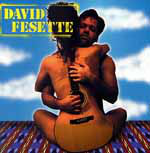 David Fesette
David FesetteDavid Fesette EP (self-released) Here's a lesson for all you unsigned bands out there. David Fesette put his contact info on the spine of his disc, as well as on the back and on his letterhead. I can't tell you how many times I spend way too much time trying to figure out where a disc came from. Bravo to David for learning the first lesson in the art of self-promotion. Lesson two: Have something good to sell. Damned if he didn't learn that as well. Fesette specializes in acoustic guitar-driven pop, though the third song here does rely on an electric lead. The sound of his guitar is great (which begs the question why so many major-label producers can't seem to figure it out), and he can really play. The songs have a soaring, atmospheric feel. I like that a lot. I wasn't as enamored of Fesette's writing style at first, but by the time I got through all three songs I was converted. He know what he wants to do, and here he does it. Latch on to the playing and let it guide you into the songs.
 Go Robot, Go!
Go Robot, Go!Wait 3 Days... Then Attack! (Bandaloop) Slipping a slightly spacey sheen over honey-drenched power pop, Go Robot, Go! pulls something of a Man or Astro-Man?. The songs are thick and gorgeous, complimented by some fine organ and keyboard work. The band members themselves are basically anonymous, and there is an almost single-minded focus on a theme (song titles like "At the Arcade," "We Have the Technology" and "[Insert Token]" certainly give a hint). All the while, the music kinda spins in its own axis. There are plenty of ways to get some distance from the pack, and these guys have done an exemplary job. No rip-off jobs here, though I will say this does sound just a bit like the old Vancouver band Pluto. I liked them a lot, too. And it sounds sooooooo good. There's a hint of the glam mixed in with the spacey accouterments. The generally mid-tempo songs are goofy and powerful enough to keep the album in motion. No slow downs or abrupt stops. Just a soft, cushy ride. Don't wait three days. Go for this now. Sugary pop this good doesn't come around very often. I'm utterly smitten.
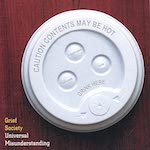 Grief Society
Grief SocietyUniversal Misunderstanding (Mangoneworld) The problem most American bands have when playing funk-rock is that they think that syncopation is all there is to funk. That and they tend to over-emphasize the back-beat instead of simply letting it speak for itself. I know, I'm making a generalization, and silly technical one at that. My point is that Grief Society doesn't make those mistakes. Funk can be found in many places, and each song calls for a different application. These boys focus on the hook. That's why these songs work so well. This album contains a new version of "Small Town," a bit more beefy than the earlier one. It's still one of the best songs I've ever heard. This rendition is a bit more funky, but not in a self-conscious way. The grooves just flow naturally. Which is where Grief Society gets it right. Hey, songwriting is a bitch. It's really hard. It can take months for that "natural" flow to be puzzled out. But everyone knows what it sounds like. And these boys, they know how find it.
 Havergal
HavergalLungs for the Race (Secretly Canadian) No matter what Havergal does, the song always ends up sounding melancholy. Maybe it's the keys of the songs. Maybe it's the guitar sound. Or maybe it's lines like "I'm in love with mother/Wish I had eyes for another." That's not fair, because the song in question there is using metaphor. Sort of. Anyway, I think you might get at what I'm saying here. This band deals from the bottom of the deck. Gleefully. The songs are sometimes sad, but mostly creepy or almost assaultive with irony. The kind of thing a critic friend of mine calls "indie hipster rock." Of course, he kinda likes the stuff, too. If there's one thing I can impart about Havergal, it's that the band constantly surprises. Yes, it sets a mood. Yes, it goes for the jugular. But the way it does these things, well, that's where the unexpected occurs. Listen until the last beat fades.
������������������������������ ������������������������������������� 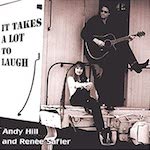 Andy Hill and Renée Safier
Andy Hill and Renée SafierIt Takes a Lot to Laugh (self-released) There are many ways to make a tribute album. Andy Hill and Renée Safier do 14 Bob Dylan songs here, some better known than others. The reason this album works (and it does) is that Hill and Safier make the songs their own. Even while (generally) using Dylan's phrasing, the duo messes with the arrangements just enough to provide a fresh take on these songs. What also helps is the bare-bones sound. Hill and Safier keep the songs acoustic (with the exception of some keyboards programmed to sound like a piano and some electric guitar on "Emotionally Yours"), and that helps the songs ring out true. Tributes like this can often sound forced or strained, like the artists are reaching for something they can't attain. Hill and Safier are extremely comfortable with these songs, and so the pieces roll off like old friends. Which, of course, they are.
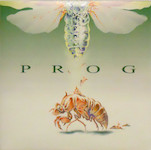 Lyle Holdahl
Lyle HoldahlProg (self-released) Lyle Holdahl sent me a couple of discs by way of mp3.com (the second gets reviewed next issue). Not the cheapest way to send stuff out, but I guess it might work if yer not sending out too much stuff. Anyway, the title of the album is most appropriate. Holdahl traffics in keyboard-laden prog music, and his compositions often resemble Yes without guitars. That might scare some folks off. It probably should. Holdahl's obsessive vision is impressive. He uses keyboards in just about every way possible, assembling line after line into his finished songs. These pieces are operatic in scope and self-indulgent to the extreme. No one else could make anything quite like this. No one else would want to make something quite like this. That said, I'm glad he did it. I have something of a craving for this kind of artistic purity. The stuff can get creepy, particularly when an artist exposes him or herself (Holdahl heads out to the edge time and again), but that voyeuristic thrill is part of the attraction here. Holdahl has something to say, and he says it in most interesting ways. The commercial potential is minimal, but the artistic side is unlimited.
���������������������������������� �������������������������������������  In Between Blue
In Between BlueHeterogene (Orchard) Evolution is a wonderful thing. I heard the first In Between Blue effort years ago, and I wasn't knocked out. With each succeeding album, the increasing confidence and sense of adventure has impressed me. No drop-off here. In fact, In Between Blue has lept off from its old plateau and landed on a much higher promontory point. The boys are still engaging in collage pop, but at a level of sophistication miles above previous efforts. While the U2 connection is still pronounced, I'd say that many of In Between Blue's songs work better than much of the Irish band's 90s efforts to redefine itself. The level of pretension just isn't here. These are fine, complex songs that don't sneer at the listener. Maybe that's the band's greatest achievement. The complex, often jazzy arrangements could be heard as overblown or excessive. But they aren't. Instead, they fit nicely into the mood and feel of the album. Some bands just keep getting better. And then some are like In Between Blue, improving by leaps and bounds. Really fine stuff.
�������������������������������������  Juniper Lane
Juniper LaneTightrope (self-released) Juniper Lane wants a bite from the red apple. Wants it real bad. Know something? It just might get there. The band's soft-pedaled groove rhythms and Vivion Smith's strong vocals are just the sort of thing that major label might want. These songs go down easy; they don't excite me much, but they're not offensive, either. And there's just enough underlying complexity. The playing is excellent, with plenty of feeling to drive the energy of the songs. like I said, this isn't exactly my sound, but I think these folks have all the tools necessary to hit it really big. They just need some luck (and, unfortunately, some punchier production). The enclosed note also called these songs "radio-friendly." They sure are. Just bland enough to be of interest to a mass audience. I'm not ripping there; if you want to be big, you can't be too original. Juniper Lane straddles the line, and does it about as well as I can imagine.
������������������������������ ������������������������������������� 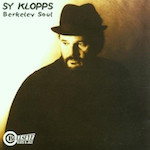 Sy Klopps
Sy KloppsBerkeley Soul (Bullseye Blues & Jazz) Somewhere between the blues and r&b, lives Sy Klopps. He drenches these songs in horns and other accouterments, somewhat disguising his average voice. Ah, the voice. The reason these songs work as blues rather than soul. Klopps has a decent voice, but it's not strong enough to carry these songs (many of them r&b standards) on their own. When he adds in all the trimmings (including Ralph Woodson's blistering guitar), well, they work. The full sound of the production really does bring out the life in these songs. This album sounds great. The band smokes, and even Klopps' limitations as a vocalist help him color his performance. Fun, though not an album that drives me to ecstasy. Just something comfy for the rainy nights.
������������������������������ ���������������������������������� ������������������������������������� 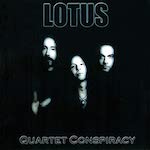 Lotus
LotusQuartet Conspiracy (Record Heaven) Some more "classic rock." And once again, that's defined a something in the Mountain range. Heavy riffage with vague blues tinges and plenty of attitude. Not unlike Bigelf, Lotus does this sound well. I mean, you've gotta dig it. Really dig it. But these boys really do have a handle on the sound, and they're not ripping anyone off. Lotus simply plays fine hard rock. No frills, no quarter asked and no quarter given. Nothing complicated. Nothing over the top. The stuff just works as it churns on down the road. There really isn't much more to talk about. If this sort of early 70s hard rock is your thing, then Lotus has a few riffs you might fancy. Turn it up loud. It will sound even better. Some things never change.
������������������������������ 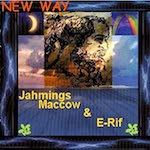 Jahmings Maccow & E-Rif
Jahmings Maccow & E-RifNew Way (Liquid Cyber) For the last 20 years or so, a lot of reggae recordings have been made on skimpy budgets, using lots of keyboards to save on studio costs. Jahmings Maccow fits right in to that tradition. It's too bad, too, because these are good songs. With a band, or at least a more skilled producer to creatively fill out the sound, this album could have really been impressive. Because despite the chintzy production values, this stuff is still pretty good. Maccow is an impassioned singer and songwriter, and his emotional range brings an unusual intensity to these songs. His songs are pure expressions of one point of view; there's no equanimity here. But that's exactly why the pieces burn so brightly. Man, I wish someone had spent an extra grand to do a better job on the drum machines (at the very least). Maccow's songs deserve a lot more than that. He's got something to say. It would be nice if he had a better platform.
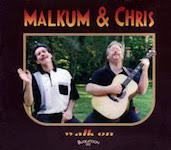 Malkum & Chris
Malkum & ChrisWalk On (self-released) This would be Malkum Gibson and Chris Kleeman. Malkum handles the harp, Chris the guitar (acoustic and steel). They swap out on the vocals. The songs are generally old standards, though one of Gibson's also makes the cut (and fits right in). The treat here is the playing. Gibson gives the harp a natural, easy-going sound, and Kleeman can pick with the best. Neither is a great singer, but both can be expressive. They don't embarrass themselves on that point. Still, I'm not listening to the singing. I'm taking in the wonderful interplay between guitar and harp. Malkum and Chris could pick and blow all night and I'd be sitting still in rapt attention. Technically, they're great, but it's the emotion and presence they exude that makes this a transcendent experience. Sometimes simplicity can bring the greatest joy. This album is just two guys sitting around, playing and singing. Anything more might well have spoiled the broth. As it is, this album has a resonance that few can match.
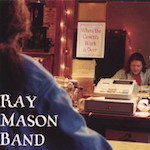 Ray Mason Band
Ray Mason BandWhen the Clown's Work Is Over (self-released) Ray Mason sings and plays guitar. His singing is rather reminiscent of Neil Young, though his guitar work is a bit more idiosyncratically normal--like, say, George Harrison or something. Mason's writing is all over the map. From bounding pop to honky-tonk country to a general roots feel, he pens songs that are instantly attractive. There's an easy-going feel that is most inviting. The sound is full, but ragged enough to leave a bit of a garage feel. For most of the songs here, that works quite well. On a couple of the more contemplative numbers, I did wish he had smoothed out an edge or two. But overall, the raucous sound serves him well. Mason ranges so far that he makes this album sound more like a collection of different bands than the output of a single entity. That's good on one hand, as it's impossible to get bored. On the other hand, Mason really doesn't define a personal sound, something that might make this album more coherent. If he could find that thread to weave through all his songs, I'd be ready and willing with an unqualified rave.
 The New Year
The New YearNewness Ends (Touch and Go) This could have been the fourth Bedhead album, except that Bedhead kinda blew up a couple of years ago. So Matt and Bubba Kadane pulled together this new band in order to continue their musical musings. Really, for all intents and purposes, this might as well be Bedhead's fourth album. The insistent, yet languid, guitar lines, the just-above-a-mumble vocals, the astonishingly enveloping sound--all here. The songs are silent assassins, as expected. Interestingly, I do hear a hint of "classic" Britpop (somewhere between the Smiths and the Wedding Present, I guess). Perhaps that had something to do with the Kadane's collaboration with Macha some time back. Not that Macha's from England or anything. It's just that I think of the band in that way. Before I confuse anyone further, let me also note that Touch and Go has managed to get the rights to the first three Bedhead albums (originally released on Trance Syndicate and distributed by T&G) and is putting them back in print. Newness Ends is more than simply a continuation of the Bedhead ideal. It outshines even Beheaded, one of my favorite albums of all time. I'm blown away.
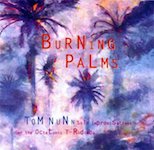 Tom Nunn
Tom NunnBurning Palms (Garuda) Tom Nunn likes to build his own instruments. Once he's constructed something new, he likes to improvise on the thing. On this disc, he's playing something called the octatonic t-rodimba. The instrument is a bit too complicated to explain fully here, but here are the basics: three sets of 11 bars set in a V shape (like a thumb piano, only bigger), three "zing trees" (which make gong sounds when struck) and a collection of other metal thingies that make lots of glorious noises. Sometimes, Nunn plinks out melodies on the Vs. Other times he plays with the metal pieces to discover new and cool scraping sounds. The best part is when he uses many pieces at once to create simply otherworldly sounds. That's what can happen when you build your own instrument. When Nunn focuses on the tuned rods, his melodies often sound like something you might hear of out west Africa. Then he'll introduce some of the resonant scraping and an entirely new sound is achieved. Creativity is a wonderful thing. Nunn not only had the imagination to build this astonishingly versatile instrument, he's figured out how to play it like a virtuoso. Don't believe me? Wait until a series of bird chirps arrive. You might think he got lucky, except that he repeats those chirps--exactly-- throughout the piece (in this case, "Fricticious Critters"). Sit back and be amazed.
������������������������������������� 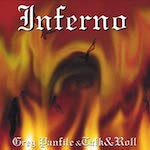 Greg Panfile & Talk & Roll
Greg Panfile & Talk & RollInferno (self-released) Back in 1977, the Cambridge Ensemble wanted to stage Dante's Inferno. Greg Panfile started to write the thing, but then an actor quit and the idea went back on the table. Panfile kept writing until 1983. He gave up. Eleven years later, he picked up the pieces and started over, with something of a more general approach toward the concept of hell on earth, rather than below. Panfile and friends (known as Talk & Roll) finally finished the project 23 years after it began. Right. So that's what we're talking about here. The music is wonderfully textured rock, flavored with accordion and (synth) horns and more. The lyrics fit in nicely with whatever path the music takes, with each making use of whatever theme Panfile has chosen for the piece. That sounds obvious, I know, but so few writers seem to be able to make those connections work. On this album, just about every junction is seamless. Each song is distinct from the others, even while retaining the core thoughts of the overall work. Ambitious and daring, Panfile's Inferno satisfies both musically and lyrically. If it took 23 years of seasoning to come up with an album like this, I'd say it was worth every day. Panfile and friends have spun a web that encompasses the world. It's easy to get stuck; you probably won't mind at all.
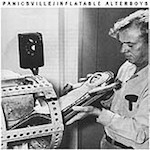 Panicsville/Inflatable Altarboys
Panicsville/Inflatable Altarboyssplit 12" (Nihilist) New Panicsville, a thought that always gets my panties in a bunch. I never know what to expect. Sometimes the sounds are utterly abstract, sometimes they're more ambient and sometimes there's even a melody. On its side of the slab, Panicsville dishes out three songs. And each of those concepts is represented. The first piece is utterly ambient, an understated noise soundscape. Simply entrancing. The second song has almost a traditional construction, complete with melody and all. The third song, while still playing around with a keyboard, is much less structured. Most intriguing. Inflatable Alterboys fills its side with one song, "Superior Twelve Inch Finger" (One of the greatest titles I've ever seen). It kinda sounds like the Panicsville, except instead of separating the three distinct approaches to electronic noise, everything gets thrown into a single pot. Not like a mishmash, but more of a bouillabaisse. The pieces are distinct within the whole. There is a consistent rhythmic idea that travels throughout most of the piece, and everything else kinda hangs off those beats at odd angles. Truly wonderful. This piece of vinyl is everything I expected (I did have high hopes) and much more. Big smiles.
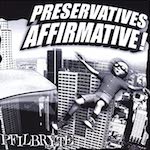 Pfilbryte
PfilbrytePreservatives Affirmative! (Fusi Pumper) Funky, bouncy electronic pop. Reminds me a bit of a band named Bootsauce. There's a nice Sly Stone r&b collage thing going on. Groove follows groove into the setting sun. The songs keep burbling on, and I'm sinking deeper and deeper into the mix. Not only are the grooves addictive, the sound is so cushy it's impossible not to settle in for the long haul. The lushness is overpowering. And yet, all that would mean nothing if the songs didn't work. It's not just the grooves after all, but what you do with them. Pfilbryte starts with the groove and then builds a song above it, piece by piece. Let me tell you, there are so many pieces that the songs resemble impressionist paintings at times. They work so well that way. The hippie soul vibe cranked out by Pfilbryte has its own charm, but everything else is so spot-on there's really no need to hang a hat on that. A completely glorious pop production. I can't hear a hole here. Is it commercial? Not really. But Pfilbryte sure is damned fine.
������������������������������ 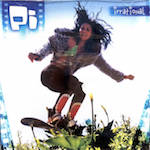 Pi
PiIrrational (Fusi Pumper) Grooves provided by Pfilbryte, songs provided by Pi. The sound is bubbly, but Pi undercuts that with her folk-pop style. She smooths out the grooves and makes this album all her own. As she should. My main problem is that I've heard plenty of singers like Pi. She's not as angry as Alanis, but certainly more intense than Lisa Loeb. And she is definitely stuck in that territory, no matter how sweet the production sound is here. The lyrics and song structures are plain. Ordinary. There's just no way to get around that. Pi sings like a girl, or at least the way I've come to expect women to sing these days. There's no surprise here. Competent? Sure. Pi doesn't embarrass herself. But she doesn't show enough to break away from the pack, either. This stuff is decent. It just isn't terribly exciting. Nothing to write home about, in any case.
Q*Ball Q*Ball EP (self-released) Space age disco with more than a hint of keyboard-driven pop. The lyrics are either spoken normally or at a hyperspeed rate. This style naturally builds intensity, and the music works pretty well, too. Ron Thal provides some guitar and also helps out in the production, adding a heavier edge to the more manic moments. Indeed, Q*Ball's fare works best when the sound is half a beat from losing control. He walks that edge more often than most would dare, and the result is three songs that are damned near irresistible. From beginning to end, I was entranced. Lots and lots of fun, with no downtime in sight.
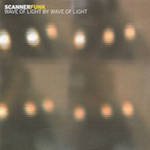 Scannerfunk
ScannerfunkWave of Light By Wave of Light (Sulfur-Beggars Group) Back in the day, we used to call stuff like this techno. Technically proficient techno, rather adventurous techno, but still the sort of stuff that falls into that territory. Generally a meditative sound, almost in the realm of the ambient electronic, but with hints of many other styles. The beats never take precedence, but they are creative. Seductively hypnotic without getting overly repetitive. Not the easiest trick to achieve. Scanner also does well with the sound, twisting the mix to build something of a 3D feel to the songs at times. This isn't full soundscape mode, but there are moments. Indeed, the album is full of fine moments. If the idea of techno (harking back to Kraftwerk or Tangerine Dream) doesn¹t frighten you, Scanner's modern take on the sound is astonishingly addictive. The hook sets quickly.
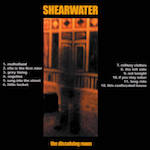 Shearwater
ShearwaterThe Dissolving Room (Grey Flat) There's a deliberate feel to these songs. They do not hurry. Shearwater plays delicate, folky songs, but they're anything but simple. They sound like they were recorded in something akin to an echo chamber, which makes the sound much fuller than the instrumentation would indicate. What I mean is, sometimes you can hear the chairs creak. This homey touch is just one of the things that makes Shearwater so inviting. The songs themselves are rather dark and, like I said, deliberate. Not naturally appealing on first listen. The emotional intensity and the sound easily overcome any initial difficulties I had. Also, more time spent with the album works as an acclimatizer. Once I got into the mindset of these songs, I really started craving the album. I needed that next song. Shearwater might sneak up on you like that. Let it. This is one of those quiet albums that sometimes screams.
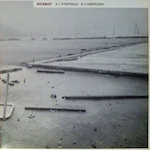 Sickboy
SickboyStripwalk CD5 (self-released) I've not quite heard something like this before. Sickboy plays emo with a folky edge. There's a definite country-rock dimension to the sound, but then again, the guitar lines are pretty much in the strident emo sound. Took me a minute to really understand what I was hearing, but once I was there I enjoyed myself immensely. Sickboy takes a number of chances with unusual melodic lines and other tricks. Most of the time, the ideas work out. A most creative way to take this sound. Sickboy's sound is most unique, and the guys do it well. An interesting way to fly emo airlines.
������������������������������������� 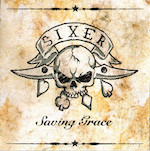 Sixer
SixerSaving Grace (TKO) Thick, melodic riffage and gravely hooks. The sorta thing that makes punk music a big wad of fun. Sixer keeps the songs moving along at a mid-tempo or faster. There's not even a hint of turgidity here. The pedal has been pushed all the way to the floor. The sing-along choruses are like crunchy candy, and the slightly refined sound gives Sixer a modicum of sophistication. Not a whale load mind you, just enough to make the boys distinctive. Just enough to break Sixer out of the pack. These guys aren't trying to change the world. They just want to play a few good songs. On that scale, they succeed admirably.
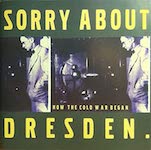 Sorry About Dresden
Sorry About DresdenHow the Cold War Began EP (Moment Before Impact) It's pretty rare that I get to pass judgment on a local band. Even though, it is true, I live in one of the more fertile music scenes in the world. Sorry About Dresden, however, is not a "normal" Chapel Hill band. First, of course, the band hails from Carrboro. Even people who live in those two towns can't always tell the difference (it's not like there are a lot of signs or anything). But really. Sorry About Dresden is (mostly) a power pop band with heavy emo overtones and a penchant for the blues. So the hooks don't soar, they merely roar. And roar they do. These are well-crafted songs played with intensity and a sense of adventure. There's a tension in the music and the lyrics that few bands can achieve. Most don't use this sort of music to tell stories. Most power pop bands can't slow songs down and still hold everything together. Sorry About Dresden, once again, isn't a "normal" band. Rather, it's an extraordinary band. These six songs contain more power than most full-length albums. They're gems just waiting to be discovered. What a treat.
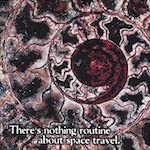 SpaceStation
SpaceStation"There's nothing routine about space travel." (Fusi Pumper) Breezy, spacey (duh) pop tunes that benefit from the Pfilbryte production touch. So there's quite the sense of fun beaming out from this disc. Hey, there's nothing wrong with trippy party music. And if SpaceStation decides to toss in a message or two, well, that's okay. Nothing can bring this stuff back to earth. It's light, but hardly lightweight. The list of players (and instruments) is lengthy, and all of those pieces find their proper place. SpaceStation's grooves are simple, and the complex decorations simply fill out the picture. The sound is resplendent. Need something to get in that early 70s soul-rock-party mood? SpaceStation lays down more than enough wax here to satisfy any jones. There are even covers of "Summer in the City" and "Sunshine Superman," though these versions are drenched in flyaway funk. Don't underestimate the power of this stuff make your booty move.
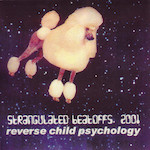 Strangulated Beatoffs
Strangulated BeatoffsReverse Child Psychology (Nihlist) Truly yummy electronic noise explorations. Strangulated Beatoffs like to play close to the edge of reality, just so they can make fun of such silly notions. A fine example is "That'll Be 200 Dollars, Ma'am." It could be the basic rhythm track for a Beck song or something, except that it's kinda fucked up with slightly excessive distortion. That and the song never breaks out of its loop. There's a message there. I swear. The loop technique dominates this disc, though it is rarely used to the extreme of "200 Dollars." Hearing the same loop (and in some cases, almost the same loop) over and over again exposes some things about mainstream music. There is, once again, also the obvious point to be taken. It's uncanny. These songs are almost on the mainstream radar. But the edge is clear, and Strangulated Beatoffs play just off the screen. Lots of fun, if you have a somewhat mordant (not to mention tolerant) sense of humor.
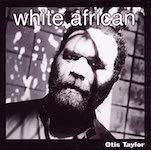 Otis Taylor
Otis TaylorWhite African (NorthernBlues) Otis Taylor plays the rural blues in the fashion of Robert Johnson, ringing out a lead line and a rhythm line at the same time on an acoustic guitar. He does dress up his songs now and again with some banjo, harp, bass, electric guitar or mandolin, but the power of this music comes from Taylor's picking and howling. And can he howl. Taylor has a raspy, yet resonant voice. His guitar was recorded so as to emphasize the lower notes and the echo, and his voice rings out above the growl of his picking. Taylor writes the blues. Songs about death, pain, suffering and the odd mystical experience. He brings his issues, his messages to the forefront without being preachy. Rather, he's just telling a story or few. Unpleasant stories, to be sure, but his presence compels attention nonetheless. A testament of rage and anguish. Much like Patty Griffin's Living With Ghosts, Taylor doesn't shy away from heavy subjects. He leads with his playing and then follows with his voice, a vicious one-two punch. Few artists could match the power of Taylor's presence on this album. For once, the term "awesome" is an understatement. ������������������������������������� |
|
return to A&A home page